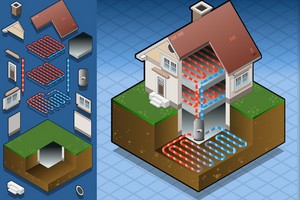Geothermal Heating & Cooling Installations In Summit County
 If you are looking for an efficient energy source, consider geothermal heating and cooling equipment. They offer very clean operation as opposed to gas heating. A heat pump buried in the ground does not create exhaust. It emits no
If you are looking for an efficient energy source, consider geothermal heating and cooling equipment. They offer very clean operation as opposed to gas heating. A heat pump buried in the ground does not create exhaust. It emits no
carbon dioxide.
Think of being inside a cave, if you can imagine it. The temperature in a cave is warmer than the outside air in the winter and cooler in the summer. This is because there is constant temperature at the depth of most caves. The temperature ranges based on depth from about 45°F to 75°F.
The type of system that’s right for you will depend on several factors. There are local building code requirements involved, the size of the property, whether or not you have a pond or lake near your home, and other things to consider.
Whichever geothermal system installation would be right for your Summit County home, Clover Comfort are the energy
efficiency experts who can do it.
Let us meet with you to discuss your options and assess your property. Our Summit County heating professionals have the right equipment for you.
How Geothermal Systems Work
A geothermal system is manufactured with three different components. They are:
Ground Loop – This is a loop of solution which is pumped through an exchanger at high velocity. There are several types available that depend on the dynamics of the homeowner’s property.
Ground Source Heat Pump – This is a geothermal heat pump for your central heating and cooling system. Some systems are designed to also heat water.
Distribution System -This includes either ductwork, a fan coil, or radiant flooring. It is a very quiet system that treats the air throughout your home.
The design of a ground source heat pump systems is also known as:
- Geoexchange
- Earth-coupled
- Earth energy system
Types of Geothermal Heating & Cooling Systems
Horizontal Closed Loop System – This is a very common geothermal system configuration. The land is excavated to bury the heat exchanger at about 6 feet deep. It is laid out horizontally.
Vertical Closed Loop System – This is designed for smaller properties. The loop system is buried vertically after a drilling rig digs.
Open Loop System – The system draws water from a well or pond to operate the heat pump. Water is discharged to a pond, stream or another well.
Pond or Lake Loop System – The heat exchanger is buried in a large body of water, generally of 1/2 acre that’s at least 10 feet deep. This is very cost-effective because no digging or drilling is necessary.
More Tips on Heating Repairs (geothermal heating, geothermal heating and cooling, geothermal heating and cooling installation)

















